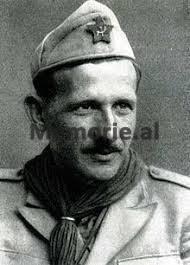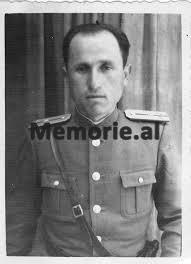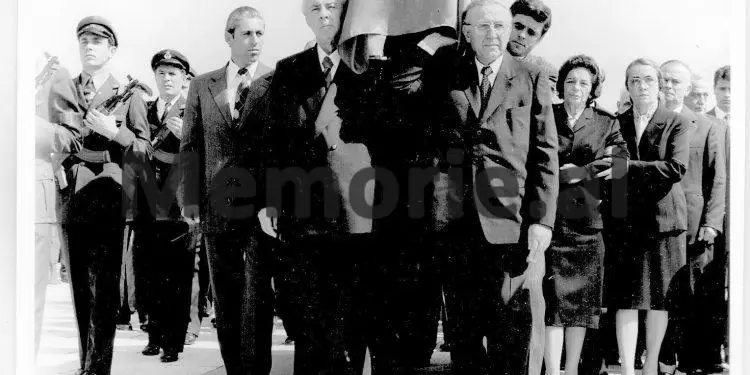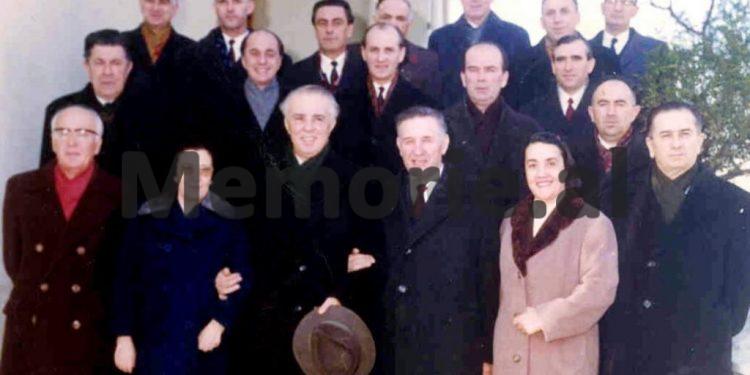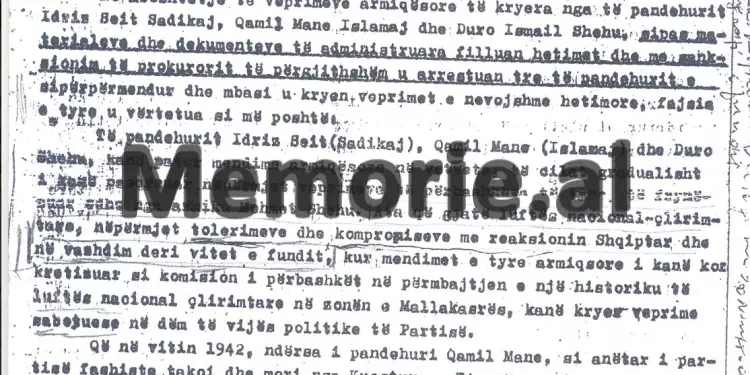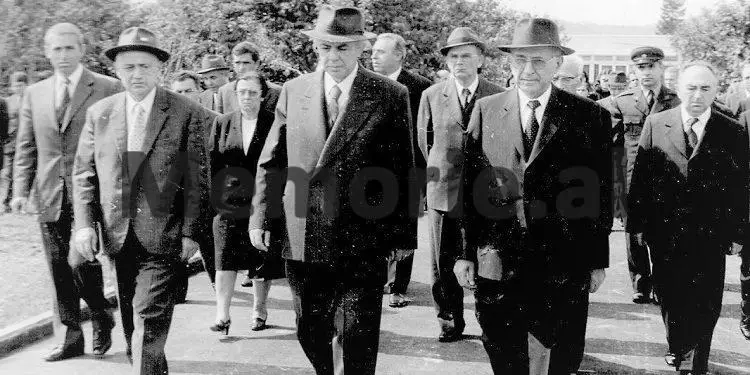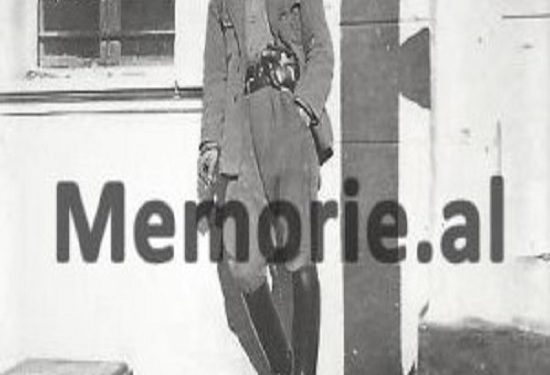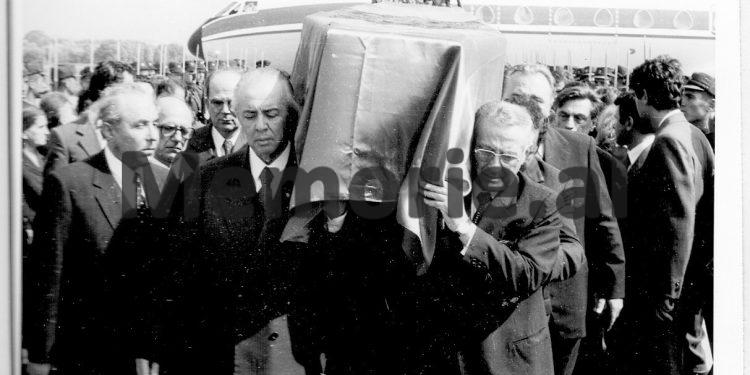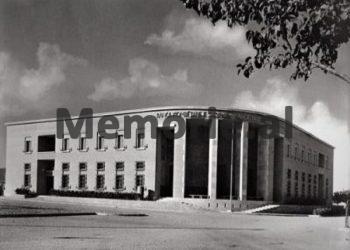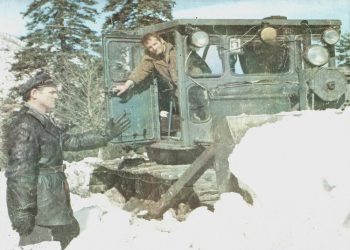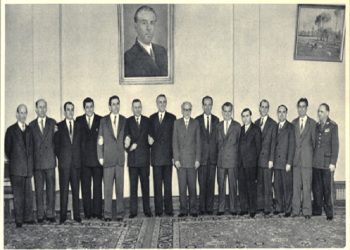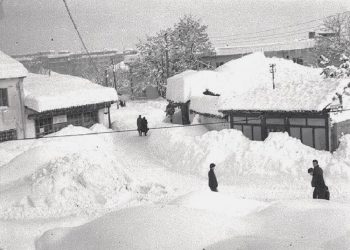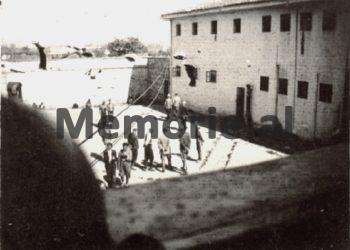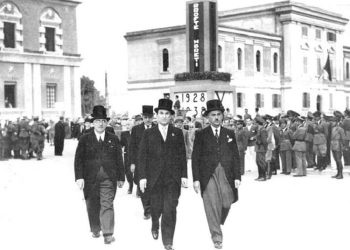Dashnor Kaloçi
second part
Memorie.al/ publishes the unknown testimonies of Colonel Idriz Seit Sadikaj, former senior military officer of the State Security in the Ministry of Internal Affairs and Mehmet Shehu closest collaborator since childhood when they were close friends in the village of Çorush of Mallakastra, who in 1982 was sentenced to 10 years in political prison, as well as the testimonies of former senior officers of the State Security TN and M.Gj. who have served for many years with the former secretary of the Central Committee of the ALP and member of the Politburo, Hysni Kapo, who covered the organs of the ‘Dictatorship of the Proletariat’, such as: the Ministry of Internal Affairs, the State Security, the Ministry of Defense People’s Courts, Courts, Investigations, Prosecution, etc. Their rare testimonies on the mysteries of Hysni Kapos death in Paris, Vito’s accusation against the Minister of Internal Affairs, Kadri Hazbiu, as well as the possible scenario of Enver Hoxha for the elimination of Kapos and Shehu since 1973, when Hoxha passed a severe heart attack and his life was questioned, and for that, he initially blamed his doctors who had suggested and approached Hysni Kapo!
“In September 1979, after learning of the death of Hysni Kapos in one of the medical clinics in Paris, where he had been hospitalized for a few days and was being treated for a serious illness, his wife Vito Kapo immediately met the minister of Internal Affairs, Kadri Hazbiu and in the midst of tears and sobs, addressed him shouting: ‘Why did you poison Hysni ?!’ After this very strong and very shocking accusation that she made against him, Minister Hazbiu, completely restrained and he calmly replied: ‘What do you have to say to me, why do not you tell him?! ‘By the word ‘him’, Hazbi was referring to Enver Hoxha. The subtext of the response of Kadri Hazbiu, a very refined and intelligent man, who had headed the organs of the Ministry of Internal Affairs and State Security since 1949, was more than clear to Hysni Kapos’s wife, who until then was the ‘two’ of communist Albania and was considered one of the main and most likely people to replace Enver Hoxha after his death.
That very short answer that Kadri Hazbiu gave to Vito Kapos against her accusation, spoke a lot! Hazbi did not claim that her husband, Hysni Kapo, had been poisoned, but she did not deny it either! But he, excusing himself that he had no finger or that he was not implicated in what Vitua was accusing him of, inadvertently letting her know that: he had no objections to her accusation, but the address was wrong and that accusation should have been directed not at him, but at Enver Hoxha. ”
This is what the retired colonel and former political prisoner, Idriz Seit Sadikaj, said, in his testimonies with the sensational story about the mystery of the death of Hysni Kapos, the most powerful man of the Albanian communist state who held the post of Secretary for years. of the Central Committee of the ALP and the most trusted man of Enver Hoxha (as secretary of the Central Committee, he had the functional task of controlling the organs of the Dictatorship of the Proletariat, the Ministry of Interior, Defense, Prosecution, Investigation, etc.), which for the first time is made public by Memorie.al.
Also, in his testimony, Idriz Seit Sadikaj, recounts his conversations with one of the former senior officers of the State Security (TN), who for many years, has accompanied for medical visits to Paris, the most senior senior leadership of the Politburo and the Albanian communist state.
But what is the truth about the death of Hysni Kapos and is there any other evidence that sheds light on it? Why Kapos’s closest man (M.GJ.) who had stood by him for 35 years, after the death of the chief, with tears in his eyes, told his most trusted people, who at that time were in positions of high in the Ministry of Interior: “They disappeared Hysni ?!
How did the response to Hysni Kapos’ medical tests performed at the Central Laboratory of the University Clinic of Tirana come about, what did the Security officers say to the laboratory doctor who performed those tests and why did she keep it secret for 20 years?
Why did Ramiz Alia, the man who was sent by Enver Hoxha to stay with Hysni in Paris, shortly before his death, remove from the room the Albanian escorts and doctors who served him?
Why did Enver Hoxha care about the elimination of Hysni Kapos and what did Enver say on the anniversary of Ramiz Alia’s birthday, in 1969, and why did Hysni Kapo and Mehmet Shehu “blacken” after those words that meant a certain testament he was leaving for the successor of his?!
Why at the end of 1973, under the auspices of Nexhmije Hoxha, one of the instructors of the Central Committee of the ALP published two articles in “Zeri i Popullit”, regarding the faction of Sadik Premte, treating and describing as’ hostile activity the failure of the defeat of that faction ‘, for which at that time Enver Hoxha had directly charged Hysni in Vlora and Mehmet in Mallakastër?
What tasks did Enver assign to Hysni and Mehmet at that time and who were the people they had to execute without trial in Vlora and Mallakastër? Why was Enver Hoxha’s order for the execution of the leaders of the Vlora District, which had been given since the spring of 1942, dragged on for a year by them, so much so that they forced Enver to go to Vlora himself?
Why did the villagers of Gjormi arrest Hysni Kapo when he went to carry out the kidnapping and execution of “Xhepi” (Sadik Premtes) and Pali Terova? Why in 1943, Enver Hoxha told “Sazan”: “You did very well to kill” Mattress “and” Milon “because that would have been done by any obedient communist of the party”, and in the early 1970s- In the two articles published in “Zeri i Popullit” under the auspices of Nexhmije Hoxha, they were declared “Martyrs of the Fatherland”, and in their motivation, it was said that they were “killed by the enemies of the people and the party”? !
Why did Mehmet Shehu “burn” those two articles, thinking that Enver was preparing the ground for a possible blow against him and Hysni Kapos (a scheme which had worked and in the elimination he had done in the past to his closest collaborators and to his deputies, such as: Nako Spiru, Koçi Xoxe, Bedri Spahiu, Tuk Jakova, etc.) and he handed Enver Hoxha the two letters, where his closest man, “Sazani” denounced those two articles ?!
Why did Mehmeti calm down when the Secretariat of the Central Committee, which met after two letters from “Sazan”, declared him “Martyrs of the Fatherland”, “Mattress” and “Milon” who were killed at the Kuta Mill and told Seit to did not bother that issue anymore?!
Why in 1982, Enver Hoxha accused Mehmet Shehu as if he had deliberately sabotaged the defeat of Sadik Friday’s faction, cunningly plotting the “incident” of the Kuta Mill, for which he himself in 1943, at Mehmet’s house in Çorush, had thanked “Sazani”?!
On these and other mysteries of the main trio of the leadership of the Albanian communist regime: Enver Hoxha, Hysni Kapo and Mehmet Shehu, we will be known through the testimonies given to us some time ago by Idriz Seit Sadika (with the nickname of the war “Sazani”) former colonel in the Ministry of Interior and one of Mehmet Shehu’s closest collaborators since the time of the War, as well as the testimonies of some former senior State Security officers like M.GJ. etc., who have served for many years near Hysni Kapos.
How did Enver Hoxha act to hit Hysni Kapo and what was the event he was caught for which at the end of 1973 when his life was put in great question due to the serious illness he went through, he began to prepare the terrain and the scenario of elimination of his two closest collaborators implicating them in hostile activities ?!
Followed by the last number
Idriz Seiti’s rare testimony about Mehmet Shehu
“In August 1942, when Mehmet Shehu was released from the concentration camp in France and came to his house in Çorush, I went and met him the next day of his arrival. After we got bored for a long time, I informed him about the political situation in the country and gave him the first tract that the Albanian Communist Party had thrown since its formation, which Kadri Hazbiu had brought to Çorush. After Mehmeti read the tract, he blushed and blushed and said to me: This work has ended, because the leadership of the Anti-Fascist War has been taken over by the traitors of the Albanian people. No party or government can determine its character by the name it gives itself. But she must clearly define what she undertakes to do after liberation. This party that has been formed must have a clear program of what it will do after the war, that the Albanian people fought and when there was no party at all. After these words Mehmeti asked me for my “Pelikan” fountain pen and locked himself in his house, ordering us not to disturb him for a few days. When he came out of the house a few days later, he called me and read me a political program, which he had written during the time he was locked inside, which he had titled: ‘What will come out after the liberation from this war that the people are waging? ‘. He had written that program in a block in three or four copies and he gave me one of them, which I hid in the holes of my house for about 40 years. “Idriz Seiti, one of the closest people with connections blood with the former Albanian Prime Minister Mehmet Shehu, from his childhood until the fatal night of December 18, 1981, a former partisan with leading positions in the First Assault Brigade and after the Military War with high positions in the Ministry of Interior and State Security with the rank of colonel and specialized in the Soviet Union, after having served many years of imprisonment since the time of the Zog Monarchy, the period of fascist occupation of the country, as well as that of the communist regime of Enver Hoxha, told us about his relationship with Mehmet Shehu and the story of how he preserved the famous letter he gave him in 1942, in which he had written an outline-political program with a social-democratic point of view! For which, Enver Hoxha after the mysterious death of the Prime Minister s Albanian, would declare that: ‘in Shehu’s safe were found highly compromising materials that shed light on his intelligence past and the sabotage he had done to the National Liberation War, collaborating with senior fascist exponents, who released him from the camp of concentration in France and brought him to Albania to put him on a mission in the ranks of the anti-fascist movement ‘!
But why did Mehmet Shehu, who had just arrived in Albania from the French internment camps, accuse the senior leadership of the Albanian Communist Party of being traitors to the Albanian people?!
How was his political program conceived and why did he write it exactly, after getting acquainted with the treaty issued by the SNP since its formation?!
Who were the other people who knew about that political program and why did Idrizi return it to the Albanian Prime Minister after almost 40 years?
Why did Mehmeti correct the title of that program that would later become the “main card” in the hand of Enver Hoxha to hit him as a “polyagent” and at the same time Idrizi, his closest collaborator?!
Idriz Seiti and his connections with the Shehu family
Idrizi was born in the village of Çorush in Mallakastra in 1918, whence the origin of his family which for several generations had emigrated to Turkey. Being from that village, Idrizi had the good fortune to know Mehmet Shehu from his childhood and to form a friendship with him that would last a long time. Regarding this, Seiti testifies: “Since we also had blood ties, his mother Sultana often came with us to sleep with Mehmet. The large Shehaj house, which was not far from us, was divided into two blocks, with some rooms which were used by the owners of the house for friends, poor, orphans, poor and for those who spent the night outside sleeping there. The Sheikhs were rich and very generous. In their house lived many poor and orphaned children whom Sultana, Mehmet’s mother, took from school and kept with bread there. There was also a very rich library in that house, from where I took Naim Frashëri’s books and read them when I went with the sheep. Mehmet as a child was known as a very smart boy in the whole province and you never saw him without a book in his hand. I remember Bektash Haxhi Çorushi, who had been on the curves in America and was the richest man in our entire area, being also a deputy of the Berat District in some legislatures of the Parliament in the time of Zog. He often came to the primary school of our village to meet the teachers since he had his children there. Bektashi, although he did not have a good relationship with Sheh Ismail, (Mehmet’s father) often stayed with Mehmet and once before school, he addressed the teachers saying: Listen, where Shehu’s son is going to make a big name in life his’. I also remember once when we were little, together with friends we announced our wishes. Mehmeti said that he wanted to live on the shore of Gjobar (a place in our village) and read all the books in the world. Another said he wanted to go to Ylinec rock to discover the treasures that were there. Mehmet addressed him, saying: ‘They are fairy tales, there is no treasure there. But I would like to build a wall there and turn the water to irrigate all the lands up to Fier and build a power plant there so that we have electricity ‘. After that, some of us said that Mehmet was crazy, or that he was the fool of Shehu. “Mehmeti wanted to make his wish come true, because around 1932, when he was studying at the Fultz Technical-Agricultural School, he brought an engineer from Tirana and together all day they looked at that part of the river at the Ylnec rock”, he recalled Idrizi his childhood and connections with Mehmet, the smart son of Shehaj.
Jakomon released Mehmet from exile in France
While Idriz Seiti was hiding in the mountains like a smuggler, as he was wanted by the government, he was informed that his friend Mehmet Shehu had come to Çorush from France. In this regard, Idrizi recalled: “Since Mehmet was interned in the camps of France, he wrote letters to the house, that they intervene in their friendly circle that had influence in the fascist government, to enable his release from internment. Mehmet’s mother, Sultana, often gave those letters to me to read. Thus, Mehmet’s father Sheh Ismaili, who was a very well-known man with great influence in political circles, intervened with some of his friends and high state officials, such as: Sheh Karbunara, Ferid bej Vokopola, (MP from Berat) Pasho Hysi, as well as Mehmet’s uncle, Gani Aliko, who had close friendships with Qazim Koculi, one of the four High Commissioners of State. As we heard then, with the help of these friends of the Shehu family, who intervened as far as Jakomoni, the Deputy of King Victor Emanuel, it became possible to release Mehmeti from the concentration camp in France and bring him to Albania. Mehmet was brought from Italy by ferry to the port of Durres, tied up and accompanied by police. There, the Italian authorities handed him over to the fascist militia, who kept him for some time in the Durrës prison, where some provocateurs were put in his cell. Mehmet, as a very smart man he was, was removed as if he would no longer engage in anti-fascist politics. “After that, with the intervention of friends from the family circle that made his release from the French internment camp possible, Mehmeti was released from the Durrës prison and returned to his home in Çorush in August 1942,” he recalled. Idrizi, Mehmet’s arrival from exile, which became possible with the intervention of Jakomon.
Compilation of the political program by Mehmeti
Regarding Mehmet Shehu’s return home, Idriz Seiti recalled: in Spain. I remember as now Mehmet’s preparations for going to the Spanish War, which motivated him, as if he were going to university in Paris. At that time, he owed three napoleons and a half gold to our fellow villager Muharrem Hyseni, mortgaging some valuable personal items. From the first day, in the big house of the Shehajs in Çorush, they started coming with dozens of friends and relatives to congratulate him on his arrival. On the second day of his arrival, I also went to his house and after we got bored for a long time, telling each other about those years we had not seen, I put him in the news on the political situation that prevailed in Mallakastra and throughout place. From the first day he came home, Mehmeti remembered that the police would have regretted releasing him from prison and for that, during the day we had set up guards, and at night we slept together in the bushes of the hills around the village. Mehmeti was well informed about the whole political situation that prevailed in the country by many other people that he sent to some cities, such as Fier, Durres, Tirana, etc. A few days after his arrival, at the end of August 1942, I gave Mehmet the first tract that the Albanian Communist Party had thrown since its creation, which had been brought from Vlora by Kadri Hazbiu, six months ago. Kadriu had left those tracts and others in Çorush at the house of Xhelal Bilal Velaj, whom he had in the friendly district. After Mehmeti read that tract, he became stern in his face and blushed and said to me: ‘This work is over, because if it is as I see and hear, I am very afraid that they have taken over the leadership of the Anti-Fascist War. in the hands of the traitors of the Albanian people. No party or government can define its character by the name it gives itself, but it must clearly define what it undertakes to do after liberation. This party that was formed must have a clear program of what it will do after the war, that the Albanian people fought and when there was no party at all ‘. After these words, Mehmeti asked me for my “Pelikan” fountain pen and after ordering us not to disturb him for a few days, he locked himself inside his house. Those five or six days he did not even go out to wait and the many people who came to congratulate him, as he had returned safe from exile. A few days after he left the house, he called me and read me a political program he had written during the time he was locked inside, which he had titled: ‘What will come out after the liberation from this war that the people are waging’. In that program, not a word was said about the Albanian Communist Party and its role in the war. It was about the way of functioning of the future Albanian state, which would come out of the war and in some points of that program, it was said that: ‘after the war, the people would enjoy all democratic freedoms, with freedom of vote, speech , the press, the strike and the creation of parties with a democratic character would be allowed ‘. He had written that program in three or four copies on his notebook and he gave me one of those copies. “Many times when we were together he would read it to me, but I did not know what opinion to give him, because not only was I not aware of what he had written, but before him I was like a calamity”, Idriz Seiti recalled, coming of his friend Mehmet from France and the political program he wrote after getting acquainted with the first tract of the Albanian Communist Party./Memorie.al
Continues tomorrow




